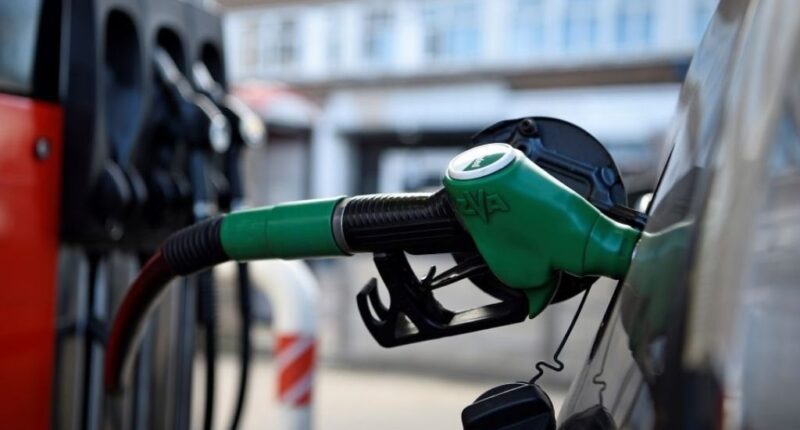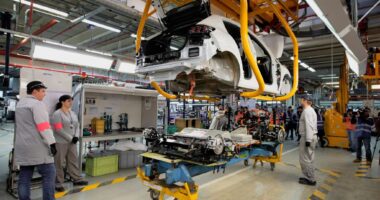Average fuel prices rose sharply across the UK last month, with motorists in Northern Ireland the worst affected, it has emerged.
In the five-week period between the start of the month and March 31, the average price of a litre of unleaded rose from 147.81p/litre to 162.82p/litre. Diesel, meanwhile, jumped from 150.97p/litre to 176.03p/litre.
The RAC is warning this Easter is set to be the “costliest on record” for those families planning on getting away and is encouraging motorists to shop around where possible.
It now costs nearly £90 (£89.80) to fill a 55-litre family petrol car – £6.38 more than it did at the start of the month – and £22 (£21.93) more than a year ago, the equivalent to a 32% increase.
The effect of the rise in diesel prices is even more pronounced with the cost of a tank up £12 (£12.13) in March, from £85.38 to £97.51 – around £15 more than at the start of January and almost £28 (£27.84) more than a year ago, a 40% hike.
UK pump prices rose more in March than in any previous month on record, despite the Chancellor announcing a 5p fuel duty cut in the Spring Statement, RAC Fuel Watch data has shown.
As well as hitting a new record-high price of 167.3p/litre on March 22, the average cost of a litre of unleaded petrol in the UK went up by 11.62p to end the month at 163.28p/litre – the largest ever increase the motoring organisation has recorded in a single month. The previous biggest monthly increase was in October of last year when petrol prices rose by 7.43p/litre.
But the rise in petrol prices was dwarfed by what happened with the cost of diesel, the RAC said, as the average price of heavy oil “rocketed by an astonishing 22.06p/litre, peaking at 179.9p on March 23”.
Ending the month at 177.29p/litre, it said the increase “is three times the size of that recorded in May 2008 – the previous worst month for diesel price rises – when the cost of a litre went up by 8.43p/litre”.
Since the Chancellor’s address to the Commons last month when he announced a 5p fuel duty cut, petrol and diesel prices have so far fallen by 3.73p and 2.61p respectively.
“Fuel prices must be starting to have an enormously detrimental effect on people’s finances…”
Simon Williams – RAC Fuel Watch spokesperson
RAC fuel spokesman Simon Williams said: “March 2022 will go down in the history books as one of the worst months ever when it comes to pump prices – over the 22 years we have been monitoring pump prices as part of our Fuel Watch initiative we’ve never witnessed such extreme rises in prices over such a short period.
“To describe the current situation facing drivers at the forecourt as ‘bleak’ is therefore something of an understatement.
“Without question, these figures show in the starkest possible terms just how much fuel prices are contributing to the cost-of-living crisis which will be affecting households up and down the country.
“We know that so many drivers depend on their vehicles – for instance, because of a lack of feasible alternatives – so fuel prices must be starting to have an enormously detrimental effect on people’s finances, especially those on lower incomes.
“Drivers might well be feeling aggrieved that the Chancellor’s ‘historic’ fuel duty cut announced in the Spring Statement just two weeks ago has done nothing to protect them from price increases.
“A 5p cut in duty should, in theory, have led to a 6p cut in prices at the pumps as a result of the Government taking less VAT – but that is on the basis that wholesale prices stay still, which is hardly ever the case, and retailers passing on their reduced costs to driver fairly.
“Petrol prices have only come down by an average of 3.73p since 23 March, taking them to a level seen just three-and-a-half weeks ago, with diesel down even less – by just 2.61p on average.”
Williams said the fuel duty cut has clearly failed to help the pockets of already hard-pressed motorists as the Chancellor had claimed at the Despatch box on March 23.
“The fact pump prices have fallen so little reflects the fact that the cost to retailers of buying fuel had been going up ahead of the Spring Statement,” he said.
“Had the Chancellor temporarily cut VAT rather than fuel duty on fuel, as we asked him to do, the impact on pump prices would have been immediate with drivers benefitting straight away. Cutting VAT would also have gone some way towards shielding drivers from future increases – something a cut in duty just can’t do.
“Sadly, this Easter – traditionally the biggest getaway time of the year on the roads – is shaping up to be the costliest on record for drivers and there’s very little they can do to escape the high cost of filling up.
“Seeking out the cheapest petrol stations and driving as efficiently as possible are the best ways of making every pound spent on fuel go as far as possible,” he added.









